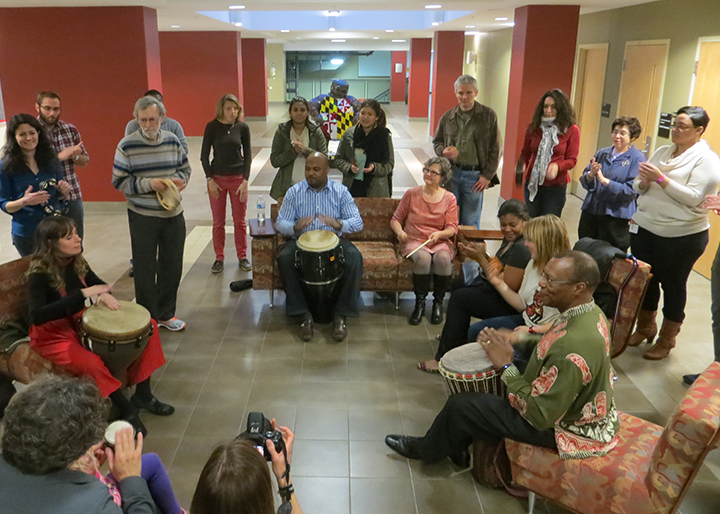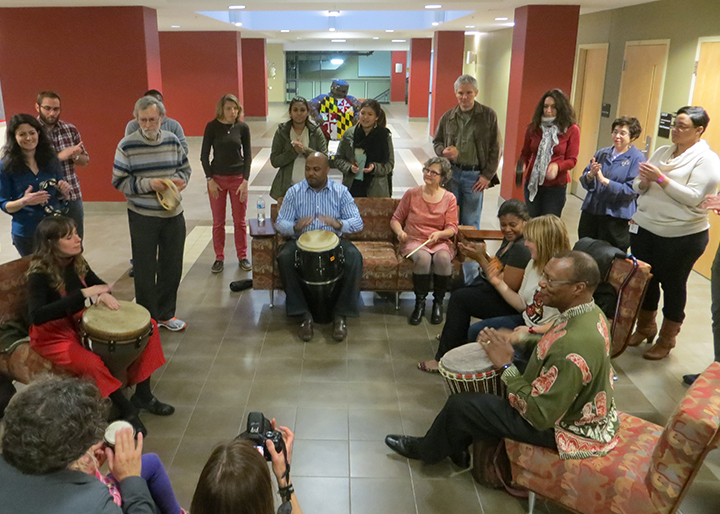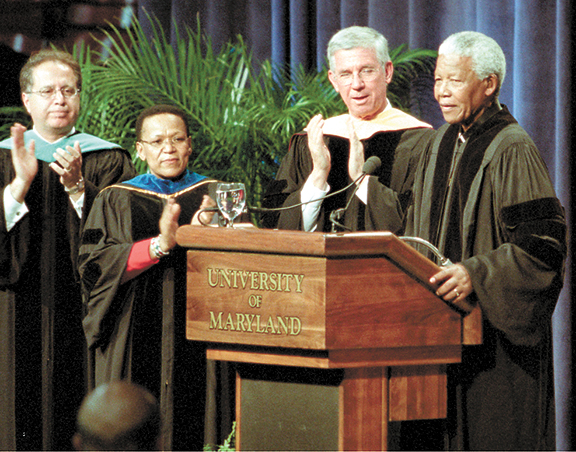Twitter erupted Thursday with the news that Nelson Mandela, an icon of freedom, hope and forgiveness, died at the age of 95.
The university honored the former South African president and Nobel Peace Prize winner, who 12 years ago spoke at Cole Field House, with a memorial drum circle in the lobby of the public health school Friday afternoon.
A group of about 40 people representing many ages, ethnicities and races circled around the lobby for the celebration, their thuds echoing those of a heartbeat. Wearing an authentic Madiba shirt from South Africa, Center for Health Equity Director Stephen Thomas sat down and, with a drum between his legs, joined in the captivating reverberations.
“I felt a deep sadness in learning of his death and a recognition that it was also an opportunity for us to never forget. His message resonated with people all over the world,” Thomas said. “It’s not easy to tap into humanity, but that’s what he did.”
Thomas traveled to South Africa in 1994, when citizens of all backgrounds were allowed to participate in the country’s general elections for the first time. There, Thomas said, he saw the impact of hope and excitement for freedom that Mandela inspired throughout the country. Thus, Thomas believed the day after Mandela’s death “could not just be a normal Friday.”
Mandela spent 27 years in prison after leading a revolution to overthrow South Africa’s apartheid government. In 1994, he became the nation’s first black president. His power to forgive and broker peace with the very people who imprisoned him continues to inspire South Africa and the world.
“Our nation has lost its greatest son. Our people have lost a father. Although we knew that this day would come, nothing can diminish our sense of a profound and enduring loss,” South African President Jacob Zuma said in his announcement of Mandela’s death. “What made Nelson Mandela great was precisely what made him human. We saw in him what we seek in ourselves. And in him, we saw so much of ourselves.”
President Obama said in his remarks on Mandela that he is “one of the countless millions” inspired by Mandela’s life — participating in an anti-apartheid protest was one of Obama’s first interactions with political policy.
“Today he’s gone home, and we’ve lost one of the most influential, courageous and profoundly good human beings that any of us will share time with on this Earth,” Obama said. “He no longer belongs to us; he belongs to the ages.”
About 12 years before his death, Mandela spoke to a crowd of 10,000 in Cole Field House with resonating words for peace about two months after the Sept. 11 attacks. He condemned the acts of terror and called peace to action.
“The terrible audacity of the events of 11 September, 2001, shook all of us out of preconceptions about peace and security in the world,” Mandela said in his speech. “In a world where, as we are now witnessing, the pursuit of peace and the conduct of war sometimes coincide, it is absolutely necessary that our international and multilateral bodies become more effective as agencies for conflict management, resolution and prevention and in the fight against terrorism.”
Mandela’s message stuck with class of 2005 alumna Jacqueline Pearce Garrett 12 years after that night in Cole Field House.
“What I remember was that there was a lot of enthusiasm for him. He is such a famous figure, and actually it was a packed crowd at Cole Field House,” Garrett said. “It was really close after 9/11. It was interesting to hear someone talk about peace and war and how the two coexist or how sometimes one is needed for the other.”
Jessica Rice, class of 2004, said she remembers the outpouring of admiration from students the night Mandela spoke.
“It was a really exciting time for folks on campus. There was definitely this collective appreciation for how important and special it was that Nelson Mandela was coming to our university,” Rice said. “It was just an indisputable moment of, ‘This is really big; this is really special.’”
In his 2001 message alerting university officials about Mandela’s address, Shibley Telhami, the Anwar Sadat Professor for Peace and Development, expressed his great admiration for Mandela, along with the importance of his words at that vulnerable time in American history.
“No other living political leader commands the respect throughout the world as Mandela,” Telhami said in the alert. “His voice carries moral authority in almost all quarters, and in this time of national and international crisis all will be listening.”
From imprisonment to presidency, Mandela’s capacity for forgiveness and humility earned him the respect and “moral authority” to command international attention.
Kevin Blackistone, a journalism professor and panelist for ESPN’s Around the Horn, covered Mandela’s tour of the U.S. in 1990 and saw the admiration Mandela garnered in each city he visited.
“To see the outpouring of people in this country for this man, who we knew who he was but you didn’t really know him, was absolutely unbelievable,” Blackistone said to Andy Pollin on ESPN SportsTalk 570. “Atlanta, Detroit, I want to say San Francisco, New York, D.C. — it was just an unbelievable outpouring of support for this guy.”
Blackistone also spent three weeks in South Africa for the 2010 FIFA World Cup. While there, he said, he learned the distinction between soccer and rugby and the profound influence Mandela inspired by example.
“The interesting thing about rugby versus soccer is, rugby is the sport of the ruling class, soccer is really the sport of the masses,” Blackistone said to Pollin. “For Nelson Mandela to embrace rugby was a real olive branch from him to the ruling minority that had been so vicious, so unbelievably vicious, to people of color in that country.”
At Friday’s memorial service, sophomore biology major Naureen Islam said the sound of the drums encapsulated the hope and happiness Mandela brought to South Africa and the world.
“Usually if you go to a funeral or something in memory of another person, it may be really sad, but this was more everyone coming together and being really happy and lively and remembering him in a good way and the good things he did,” Islam said.
Yoojin Park, a sophomore marketing major, learned of Mandela’s death on Twitter and decided she wanted to commemorate his death by attending the memorial service.
“[The drum circle] brought so many different people together. You see different races here, different ages here, and just everyone is here together to commemorate this one man and all the great things he did for us,” Park said. “I thought it was just amazing.”
Nelson Mandela (right), former South African president, speaks at Cole Field House in November 2001, about two months after the Sept. 11 attacks.





